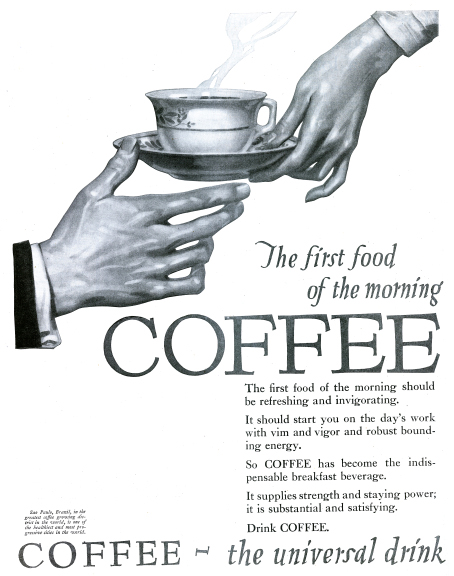New York roaster encouraged Americans to wake up and smell the coffee. Fund at The Trust supports infant children.
Mabel Wilson Weir (1871-1925)
Ross W. Weir (1859-1932)
“COFFEE, the first food of the morning should be refreshing and invigorating,” proclaims a 1920 ad in the Saturday Evening Post. “It should start you on the day’s work with vim and vigor and robust bounding energy.”

Apparently, Americans woke up to the benefits of the “indispensable breakfast beverage.” Today, about 75 percent of U.S. adults drink at least one cup a day, and they can largely thank Ross Weir, a New York coffee trader, and the National Coffee Roasters’ Association. Ross chaired the roasters’ publicity committee in 1919, when they voted to advertise their java in 306 daily newspapers in 186 cities during a two-year campaign.
For years, the president of the eponymous Ross W. Weir & Company sent his own coffee salespeople as far afield as North Dakota, Ohio, Wisconsin, and Oklahoma to brew free cups of his Red Ribbon Mocha and Java brands in grocery stores and markets. In each town, he placed ads in the local paper inviting readers to stop by and sample “the best coffee on Earth.”
With the beginning of Prohibition and its ban on alcohol, Ross persuaded the 400-member roasters’ group to join South American growers in boasting about the benefits of coffee. They also advocated coffeehouses as gathering spots to replace saloons and hailed the bargain price of a cup of excellent, nonintoxicating coffee compared to the high cost of a strong drink.
In November 1921, at the coffee roasters’ annual meeting, Ross announced: “Recent government figures showed that the per capita consumption of coffee during the two years ending June 20…increased 21 percent!”
How did that happen? “Coffee advertised. Tea did not,” Ross told the roasters. “Coffee drinking increased. Tea drinking decreased. There you have the situation in a nutshell.”
Ross Wood Weir was born October 29, 1859, in New York City to James Boyd Weir and Frances Elizabeth Wood. His father, known as J.B., was one of the pioneer forty-niners and at one time worked in the export commission business in San Francisco.
Ross was 15 when he began his career as a general utility boy in the grocery house of S.H. Williamson on Broadway in Manhattan. He then clerked for Park & Tilford, another grocer, before joining the tea-importing enterprise of George C. Chase & Company as “office man” and junior partner.
In 1886, he started Ross W. Weir & Company “to engage in the roasting of coffee and the importing and jobbing of teas” at 105 Front Street. From 1914 to 1916, Ross was president of the National Coffee Roasters. In 1915, he took over E. J. Gillies & Company, another major coffee importer, and his business kept growing.
Mabel Wilson was born February 19, 1871, in New York. She and Ross were married October 16, 1895. They had no children. She died on July 8, 1925. After her death, Ross traveled extensively, including cruises to England, Ireland, Puerto Rico, and Hawaii, and spent time with his brother William in California. He died July 24, 1932.
Ross had established a remainder trust for two of his sisters, Eleanor B. Weir and Frances E. Weir. After they passed, the trust eventually became a fund in The New York Community Trust for Protestant agencies serving infant children.